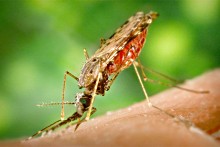
Credit: CDC/2005.
Geneva, 24 July 2014 – The world’s first vaccine capable of protecting children from malaria has taken a positive step towards becoming available. This week, GlaxoSmithKline plc (GSK) formally sought a special review under article 58, for its RTS,S vaccine from the European Medicine Agency (EMA). This application follows promising phase III clinical results last year, which showed that, when used with other interventions such as bed nets, the vaccine can provided up to 46% protection against malaria, when given to children 5-17 months old.
This review allows the EMA to assess the quality, safety and efficacy of a candidate vaccine or medicine, manufactured in an EU member state for a disease recognised by the World Health Organization (WHO) as of major public health interest, but intended exclusively for use outside the European Union (EU). This assessment is carried out by the EMA in collaboration with WHO, and requires products to meet the same standards as vaccines or medicines intended for use in the EU.
“This is an important development. Malaria kills hundreds of thousands of children under the age of five every year, and RTS,S is the first vaccine to show promising signs of protection,” said Dr Seth Berkley, CEO of the GAVI Alliance. “When used in conjunction with insecticide-treated bed nets and anti-malarial drugs, a licensed vaccine has important potential to protect vulnerable children. To assess the large-scale value of a licensed vaccine it will be important to understand the duration of protection and the impact of booster shots, when further data is released.”
In November 2013 GAVI’s Board agreed to consider support for a malaria vaccine if and when one is licensed, prequalified by the World Health Organization (WHO) and recommended for use by WHO’s Strategic Advisory Group of Experts (SAGE) and the Malaria Programme Advisory Committee. Any future decision to support a malaria vaccine will take into account projections of impact, costs and country demand for the vaccine.

Credit: CDC/2005.
Geneva, 24 July 2014 – The world’s first vaccine capable of protecting children from malaria has taken a positive step towards becoming available. This week, GlaxoSmithKline plc (GSK) formally sought a special review under article 58, for its RTS,S vaccine from the European Medicine Agency (EMA). This application follows promising phase III clinical results last year, which showed that, when used with other interventions such as bed nets, the vaccine can provided up to 46% protection against malaria, when given to children 5-17 months old.
This review allows the EMA to assess the quality, safety and efficacy of a candidate vaccine or medicine, manufactured in an EU member state for a disease recognised by the World Health Organization (WHO) as of major public health interest, but intended exclusively for use outside the European Union (EU). This assessment is carried out by the EMA in collaboration with WHO, and requires products to meet the same standards as vaccines or medicines intended for use in the EU.
“This is an important development. Malaria kills hundreds of thousands of children under the age of five every year, and RTS,S is the first vaccine to show promising signs of protection,” said Dr Seth Berkley, CEO of the GAVI Alliance. “When used in conjunction with insecticide-treated bed nets and anti-malarial drugs, a licensed vaccine has important potential to protect vulnerable children. To assess the large-scale value of a licensed vaccine it will be important to understand the duration of protection and the impact of booster shots, when further data is released.”
In November 2013 GAVI’s Board agreed to consider support for a malaria vaccine if and when one is licensed, prequalified by the World Health Organization (WHO) and recommended for use by WHO’s Strategic Advisory Group of Experts (SAGE) and the Malaria Programme Advisory Committee. Any future decision to support a malaria vaccine will take into account projections of impact, costs and country demand for the vaccine.
